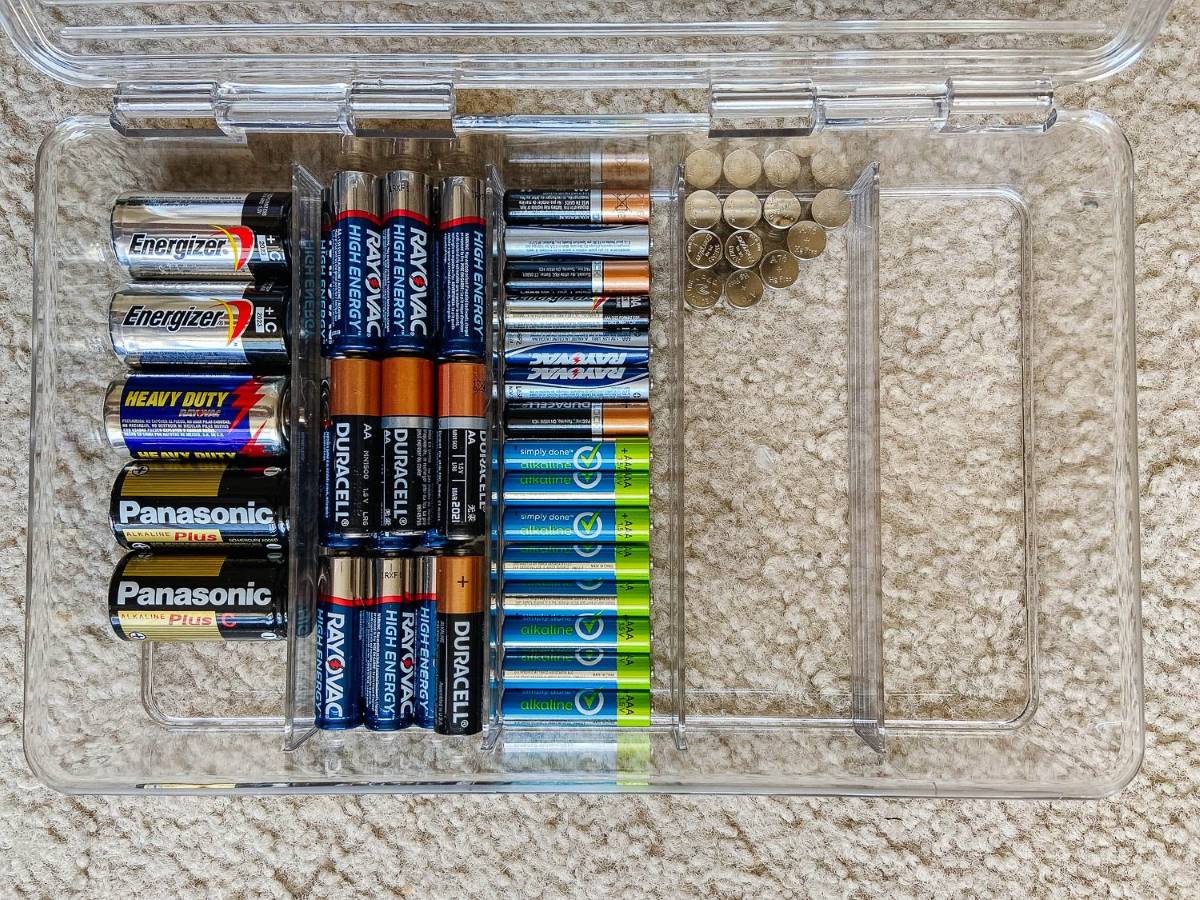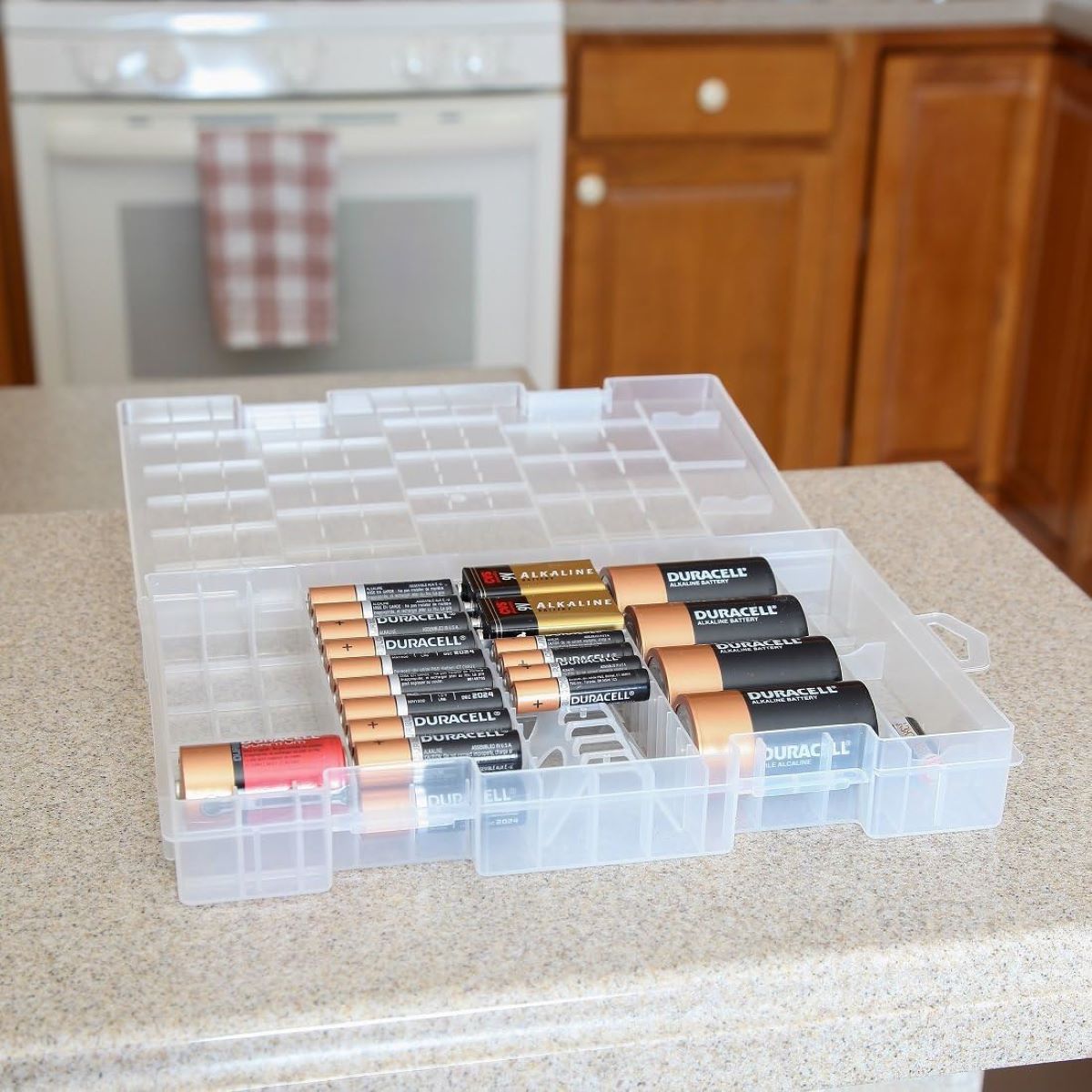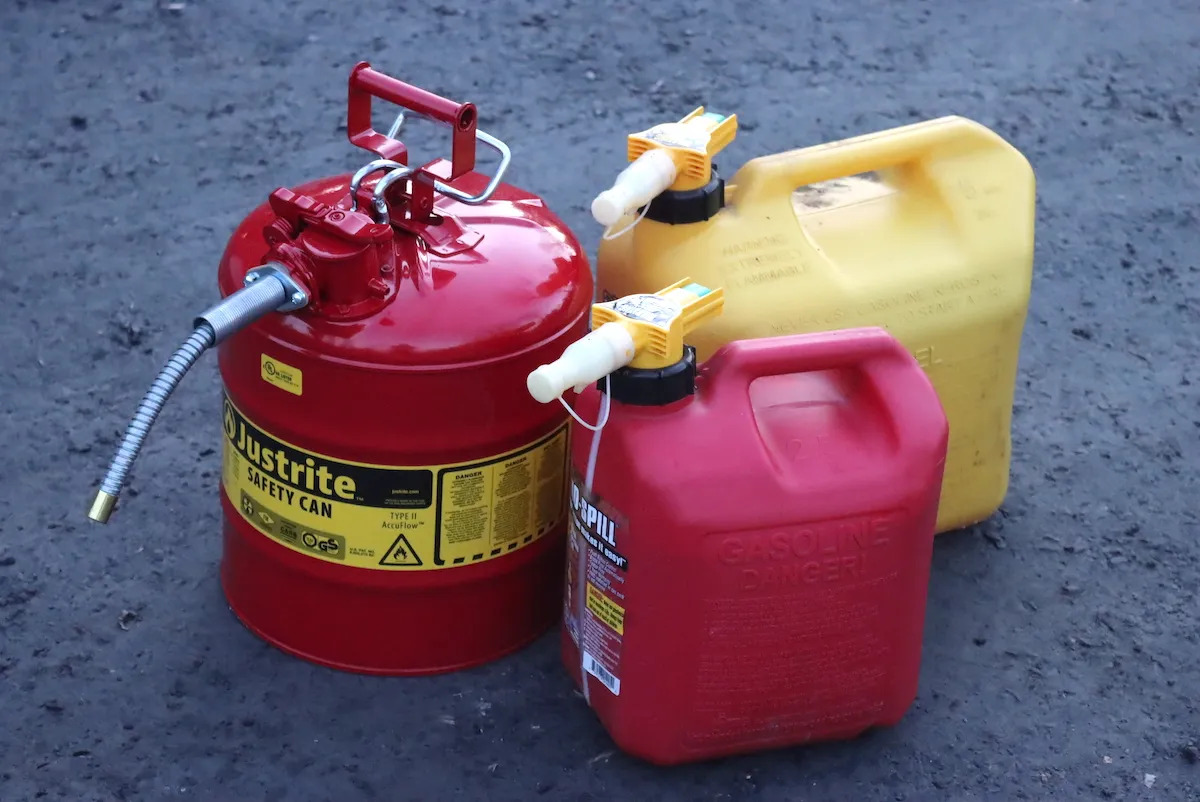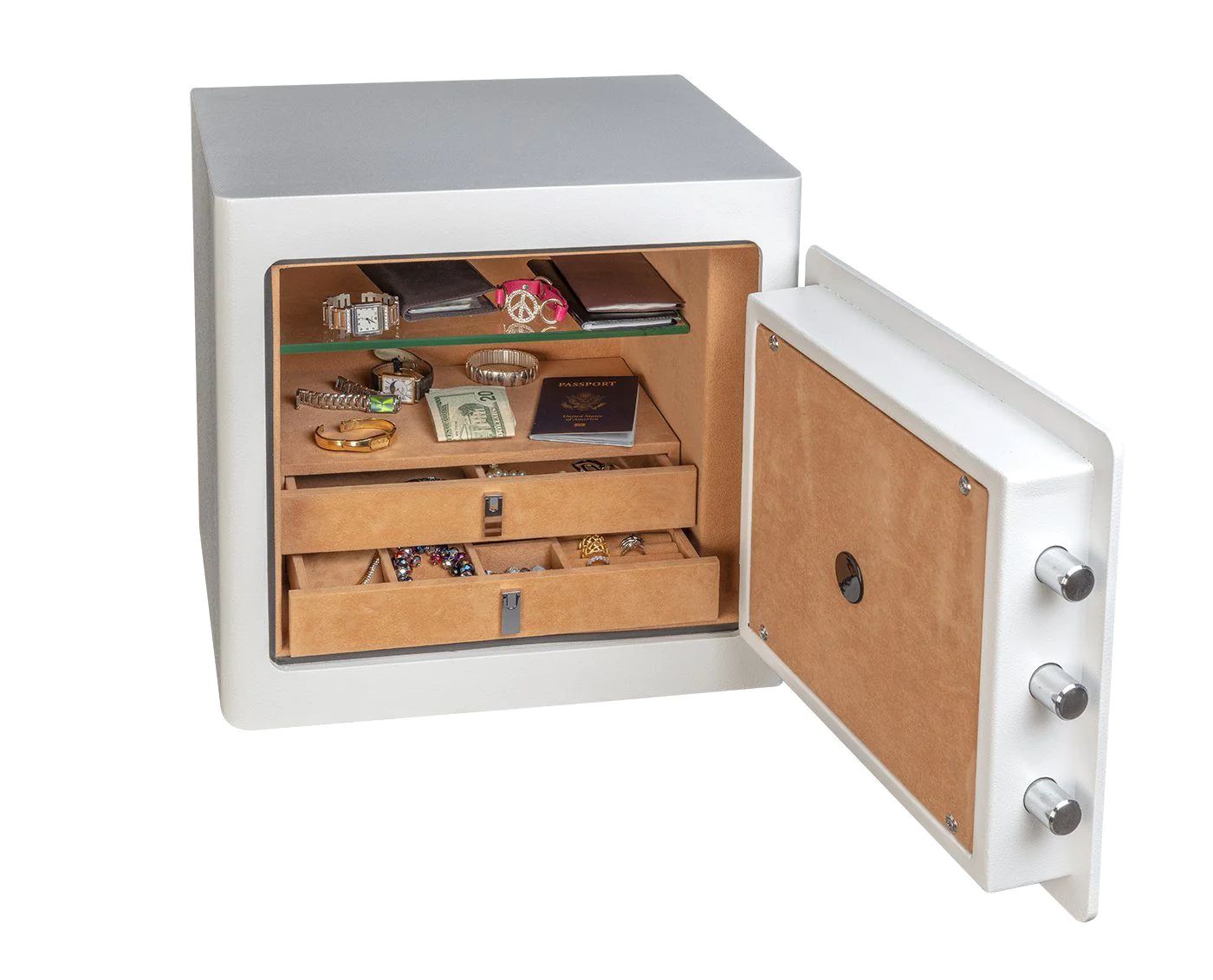

Articles
How To Safely Store Batteries
Modified: January 19, 2024
Discover the best ways to safely store batteries with our informative articles. Keep your batteries organized and free from potential hazards.
(Many of the links in this article redirect to a specific reviewed product. Your purchase of these products through affiliate links helps to generate commission for Storables.com, at no extra cost. Learn more)
Introduction
As technology continues to advance, batteries have become an essential component of our daily lives. From powering our smartphones and laptops to providing energy for electric vehicles, batteries play a crucial role in keeping our devices running smoothly. However, when it comes to battery safety, many people tend to overlook the importance of proper storage.
Storing batteries safely is not only essential for prolonging their lifespan but also for preventing accidents such as leaks, overheating, or even explosions. Many of us have experienced the frustration of finding a drawer filled with dead or corroded batteries, but with the right storage techniques, you can ensure your batteries stay in top condition and are ready to use when needed.
In this article, we will discuss the importance of battery safety and provide you with practical tips on how to safely store batteries. Whether you are a technology enthusiast, a parent, or an avid DIYer, understanding proper battery storage techniques will help you avoid potential hazards and maximize the lifespan of your batteries.
Key Takeaways:
- Proper battery storage is essential for safety and longevity. Choose the right location, prepare batteries carefully, and use appropriate containers to ensure they remain in optimal condition for future use.
- Long-term battery storage requires additional precautions. Charge batteries before storage, stagger expiration dates, and perform periodic maintenance to maintain their performance and safety.
Read more: How To Store Batteries Safely
Understanding Battery Safety
Before diving into the specifics of battery storage, it’s crucial to have a clear understanding of battery safety. Batteries, especially rechargeable ones, contain chemicals and components that can be potentially dangerous if not handled properly.
One of the primary concerns when it comes to battery safety is the risk of leakage. Batteries can leak corrosive substances, such as alkaline or acidic electrolytes, which can damage your devices or pose a health hazard if they come into contact with your skin or eyes. In addition to leakage, batteries can also overheat or even explode if they are exposed to extreme temperatures, improperly charged, or physically damaged.
Therefore, it is extremely important to follow proper safety guidelines when storing batteries to prevent accidents and ensure their longevity. By taking the time to understand battery safety, you can make informed decisions about how and where to store your batteries.
Choosing the Right Storage Location
When it comes to storing batteries, choosing the right location is essential for maintaining their safety and performance. Here are some key considerations for selecting the ideal storage area:
- Avoid Extreme Temperatures: Batteries are sensitive to temperature fluctuations. Extreme heat or cold can impact their performance and shorten their lifespan. Therefore, it is important to choose a storage location that remains within a moderate temperature range. Avoid storing batteries in areas prone to direct sunlight, such as windowsills or near heat sources like radiators or ovens.
- Keep it Dry: Moisture can damage batteries and lead to corrosion or leakage. Choose a storage area that is dry and free from any water or humidity. Avoid storing batteries in basements or areas prone to dampness. Consider using moisture-absorbing packets or silica gel packs in your battery storage containers to help keep the area dry.
- Provide Adequate Ventilation: Some batteries, particularly lithium-ion batteries, can release gases when they are stored for long periods. It is important to ensure that the storage area has proper ventilation to allow any released gases to dissipate safely. Avoid storing batteries in enclosed spaces without adequate airflow.
- Keep Away from Flammable Materials: Batteries, especially rechargeable ones, contain flammable chemicals. It is important to store batteries away from any flammable materials or substances that can potentially ignite. Avoid storing batteries near gasoline, cleaning agents, or any other flammable items.
- Consider Safety Codes and Regulations: If you are storing a large number of batteries, it is important to check local safety codes and regulations. Some areas may have specific requirements for battery storage, especially for businesses or institutions. Adhering to these guidelines will help ensure you are storing batteries safely and in compliance with regulations.
By choosing the right storage location, you can minimize the risk of accidents, prolong the lifespan of your batteries, and ensure they are ready for use when needed.
Preparing Batteries for Storage
Properly preparing your batteries before storage is an important step in maintaining their safety and maximizing their lifespan. Here are some key tips to keep in mind when preparing batteries for storage:
- Check for Signs of Damage: Before storing your batteries, inspect them for any signs of damage, such as leaks, corrosion, or physical deformities. If you notice any damage, it is best to dispose of the battery properly rather than storing it.
- Remove Batteries from Devices: If your batteries are inside electronic devices that you wish to store, it is crucial to remove them before storage. Leaving batteries inside devices for prolonged periods can lead to power drain or potential damage to the device. Be sure to remove the batteries and store them separately.
- Clean the Battery Contacts: Over time, battery contacts can accumulate dirt, dust, or corrosion, which can hinder their performance. Before storage, use a clean cloth or cotton swab dipped in isopropyl alcohol to gently clean the battery contacts. This will help ensure a good connection when you use the batteries again.
- Keep Battery Terminals Protected: To prevent accidental short-circuiting, it is important to keep the battery terminals protected during storage. You can use battery terminal covers or simply place a small piece of tape over the terminals to insulate them. This will help prevent any unintended contact or discharge.
- Organize and Label: For convenience and easy access, organize your batteries in storage containers or compartments. It is also helpful to label the batteries based on their type, size, and date of purchase to track their age and usage. This will help you identify older batteries that may need to be replaced.
By taking the time to properly prepare your batteries before storage, you can ensure they remain in good condition and are ready for use when you need them.
Store batteries in a cool, dry place at room temperature. Avoid extreme temperatures and direct sunlight, as they can reduce battery life and performance. Keep them in their original packaging or use a battery organizer to prevent short circuits.
Storing Batteries Properly
Once you have prepared your batteries for storage, it is important to store them properly to maintain their safety and performance. Here are some key guidelines for storing batteries:
- Use Battery Cases or Organizers: To prevent contact between batteries and potential hazards or each other, consider using battery cases or organizers. These containers are specifically designed to hold batteries securely and keep them separated. They are available in various sizes, allowing you to store different battery types conveniently.
- Avoid Metal Containers: Metal containers or tin foil should be avoided when storing batteries. Metals can conduct electricity and may cause accidental discharge or short-circuits, leading to safety risks. Opt for non-conductive storage options like plastic containers or cases specifically designed for battery storage.
- Keep Different Battery Types Separated: Different batteries have different chemistries and capacities, so it’s important to keep them separated in storage. Mixing different battery types can lead to potential leakage or discharge. If possible, store batteries of the same type and brand together to avoid any cross-interactions.
- Store Batteries Upright: It is best to store batteries in an upright position rather than horizontally. Storing batteries upright helps prevent accidental contact between the terminals and reduces the risk of short-circuiting.
- Avoid Excessive Force or Pressure: When storing batteries, avoid placing excessive force or pressure on them. This can lead to damage or permanent loss of capacity. Store batteries in a way that minimizes any unnecessary compression or stress on them.
- Keep Away from Children and Pets: Store batteries in a location that is out of reach of children and pets. Batteries can be a choking hazard, and if accidentally ingested, they can cause serious harm. Ensure that the storage area is secure and inaccessible to curious hands or paws.
By following these guidelines, you can store your batteries properly and reduce the risk of accidents, leaks, or damage while ensuring they remain in optimal condition for future use.
Read more: How To Store Batteries Safely At Home
Tips for Long-term Battery Storage
If you plan to store your batteries for an extended period, such as several months, it’s important to take some additional precautions to ensure their longevity and safety. Here are some tips for long-term battery storage:
- Charge Before Storage: Before storing your rechargeable batteries, it is best to fully charge them. This helps prevent self-discharge and keeps the battery at an optimal charge level during storage. Be sure to use the appropriate charger for your battery type and follow the manufacturer’s instructions.
- Stagger Expiration Dates: If you have multiple batteries with different expiration dates, it’s a good idea to stagger them in storage. This ensures that you use the older batteries first and prevents them from sitting unused for an extended period. This practice helps prevent the degradation of battery performance due to extended storage time.
- Perform Periodic Maintenance Charges: For rechargeable batteries, it is recommended to perform periodic maintenance charges during long-term storage. This involves charging and discharging the battery every few months to prevent self-discharge and keep the battery active. Be sure to follow the manufacturer’s guidelines for maintenance charging.
- Check and Rotate Batteries: Regularly check the status of your stored batteries, even during long-term storage. Inspect them for any signs of leakage, corrosion, or damage. Additionally, consider rotating the batteries by using the stored ones and replacing them with fresh ones. This ensures that all your batteries are regularly used and maintained.
- Keep Records: Keeping a record of battery storage dates, usage, and any other relevant information can be helpful. This allows you to track the age and performance of your batteries over time. It also helps you identify any changes in battery performance and plan for replacements if needed.
- Monitor Temperature and Humidity: If possible, monitor the temperature and humidity levels in the storage area. Extreme temperature fluctuations or high humidity can negatively impact battery performance and lifespan. Consider using a thermometer and a hygrometer to ensure the conditions remain within the recommended range.
By following these tips, you can ensure that your batteries remain in optimal condition during long-term storage and are ready for use whenever you need them.
Frequently Asked Questions (FAQs)
Here are some frequently asked questions regarding battery storage:
- Q: Can I store different battery types together?
- Q: How long can batteries be safely stored?
- Q: Do I need to remove batteries from devices for storage?
- Q: Can I store batteries in the refrigerator or freezer?
- Q: How can I dispose of old or damaged batteries?
A: It is generally advisable to store batteries of the same type together to prevent potential leakage, discharge, or cross-interaction. Different battery chemistries and capacities can have different storage requirements, so keeping them separated is recommended.
A: The safe storage duration for batteries depends on various factors such as the battery type, manufacturer’s recommendations, and storage conditions. Generally, most batteries can be safely stored for several months to a couple of years. It’s best to check the manufacturer’s guidelines for specific recommendations.
A: Yes, it is recommended to remove batteries from devices before long-term storage. Leaving batteries inside devices can lead to power drain or potential damage to the device. Removing the batteries helps prolong their lifespan and prevents any potential issues.
A: Storing batteries in the refrigerator or freezer is generally not recommended. The moisture levels in these appliances can cause condensation on the batteries, leading to potential damage. It is best to store batteries in a cool, dry place at moderate room temperature.
A: Old or damaged batteries should be disposed of properly to prevent environmental contamination. Many communities have designated recycling centers or programs for battery disposal. Check with your local recycling facilities for specific guidelines on how to dispose of batteries safely.
It’s important to note that while these answers provide general guidance, it’s always recommended to follow the specific instructions provided by the battery manufacturer for safe storage and disposal.
Conclusion
Proper battery storage is crucial for maintaining their safety, maximizing their lifespan, and ensuring they are ready for use when needed. By following appropriate storage practices, you can prevent accidents, leaks, and damage, ultimately saving you time, money, and potential hazards.
In this article, we discussed the importance of battery safety and provided practical tips for safely storing batteries. We emphasized the significance of choosing the right storage location, preparing batteries for storage, and using proper storage containers or organizers. Additionally, we offered guidance on long-term storage considerations and answered some common questions regarding battery storage.
Remember to always check the manufacturer’s recommendations for the specific type of battery you are storing, as different batteries may have slightly different requirements. Take the time to inspect your batteries for damage, clean the contacts, and organize them in a way that ensures safety and easy access.
By implementing these best practices, you can prolong the lifespan of your batteries, minimize the risk of accidents, and ensure they are in optimal condition when you need them. So, whether you are storing batteries for your electronic devices, emergency preparedness, or any other purpose, adhere to proper storage techniques and enjoy the peace of mind that comes with safe and effective battery storage.
Frequently Asked Questions about How To Safely Store Batteries
Was this page helpful?
At Storables.com, we guarantee accurate and reliable information. Our content, validated by Expert Board Contributors, is crafted following stringent Editorial Policies. We're committed to providing you with well-researched, expert-backed insights for all your informational needs.















0 thoughts on “How To Safely Store Batteries”